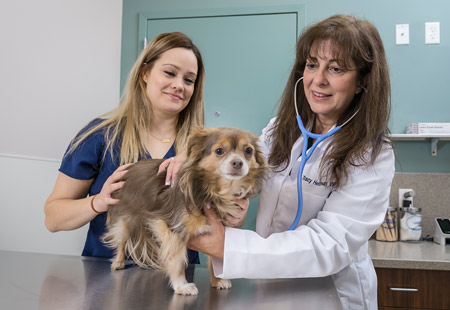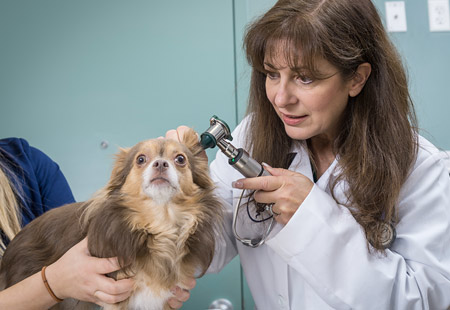

Pet Wellness Services

Regular Wellness Examinations
A regular physical examination is just as important for your pet as it is for you. Because your pets can't tell you how they really feel, the veterinarians at Central Veterinary Center recommend a complete physical examination at least once a year, though more frequent exams are encouraged.
A routine examination provides you and your veterinarian with the opportunity to develop a picture of your pet's overall health as well as to spot potential medical issues before they become serious health concerns. It's also an opportunity for you to ask your veterinarian important questions about your pet's health, habits and daily care. We also use this time to inform you about home healthcare for your pet and offer important advice on the care of your particular type and breed of animal.
During your pet's wellness check-up, a veterinarian will:
- Listen to your pet's heart – Early signs of cardiac disease such as heart murmurs and abnormal heart beat patterns known as arrhythmias can be heard through a stethoscope. Discovering these initial indicators of trouble ahead can lead to identifying and treating the underlying condition before it becomes a more serious health threat.
- Listen to your pet's lungs – Health issues such as infections, obstructive diseases and other problems can be detected by listening to your pet's lungs through a stethoscope. The doctor can also assess the overall pulmonary health of your pet.
- Check your pet's teeth and oral cavity – Examining your pet's teeth and mouth is an important part of preventing dental disease, which is one of the most common health concerns in pets. Very young animals, such as kittens and puppies, also need to be checked to ensure they are developing an appropriate bite and that they are losing their baby teeth at the right time. We also take the time to discuss proper home dental care with you.
- Evaluate your pet's vision – Ocular conditions can be prevented through regular care and screenings. We examine your pet with an ophthalmoscope each visit to look for early changes in the retina, lens and iris. We also look for Glaucoma and Keratoconjunctivitis Sicca (dry eye), which are a couple of eye problems that can have severe complications if left untreated.
- Look into your pet's ears – As with dental disease, ear disease is relatively common in pets. Issues such as allergies, swimming or improper bathing, food allergies, mites and other parasites can all contribute to different forms of ear disease. Many ear diseases are difficult to detect and require examination by a veterinarian.
- Palpate the lymph nodes, abdomen and skin – By feeling the skin, we are looking for unusual lumps or swellings as well as evaluating for skin discolorations, lesions or patterns of hair loss or thinning. These can indicate the presence of more systemic problems, especially metabolic diseases, which most commonly occur in middle-aged animals.
- Palpate joints and muscles – By examining the joints, legs and other areas of the body, we are able to evaluate for swollen joints, decreased muscle tone and variations in muscle size between the legs. We also observe your pet's gait for developmental issues. In puppies, we look for early indications of hip or elbow problems. For older pets, we look for signs of arthritis, which can be treated if found early.
- Lab work – As part of your pet's annual examination, we recommend a heartworm/lyme/ehrlichia/anaplasma combination test. It is important to detect these mosquito and tick-borne diseases early in order to avoid serious health consequences. A fecal floatation test for the detection of intestinal parasites is recommended every 6 months. For pets 7 years of ages or older, we also recommend a complete blood cell count and a chemistry profile in order to create a baseline of systemic health and to detect any emergent disease processes.

Vaccinations

Vaccinations are not only safe and effective; they are an important and fundamental piece of your pet's preventive healthcare plan. Advances in veterinary immunology have made diseases that once were relatively common and fatal to pets easily preventable. Additionally, with each passing year, veterinary science is improving on existing vaccines as well as increasing the ability to prevent an even wider array of contagious diseases.
At Central Veterinary Center, we have developed a protocol designed to protect your pet from the diseases he or she is most likely to be exposed to in this region of Pennsylvania. We work with you to develop a strategy that takes into account your pet's unique lifestyle and risk factors. We seek to administer the least number of vaccines necessary to protect your pet.
Dr. Heitzman truly believes that Central Veterinary Center's carefully balanced approach is the best means to prevent infectious disease and the possibility of your pet having an adverse reaction to a vaccine.
|
Core Vaccines for Puppies and Adult Dogs:
Other Available Vaccines for Puppies and Adult Dogs:
|
Core Vaccines for Kittens and Adult Cats
Other Available Vaccines for Kittens and Adult Cats
|

Parasite Prevention and Control
Parasites can be real pests. Both external (fleas, ticks) and internal (heartworm, hookworm, roundworm) parasites can cause problems for both your pet and your family. Prevention is the best approach to eliminating these pests. Please ask a staff member at Central Veterinary Center for the best way to prevent parasite problems in your pet.
Heartworm Disease Dangers for Chalfont Pets
Spread by mosquitoes, heartworm disease is serious disease. Fortunately, preventive medications exist to prevent heartworm disease in your beloved companion. The veterinarians at Central Veterinary Center recommend administering preventive medication once-a-month, all year long.



